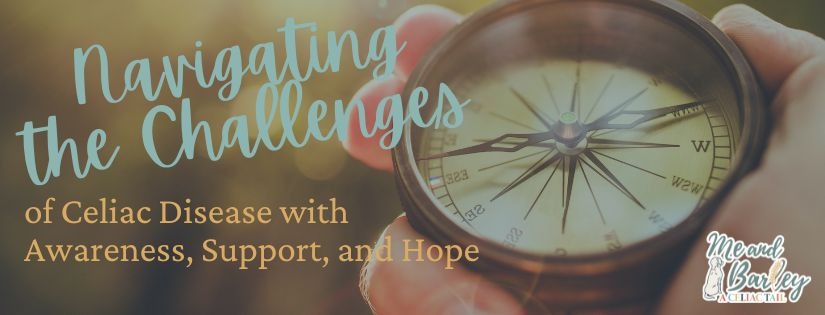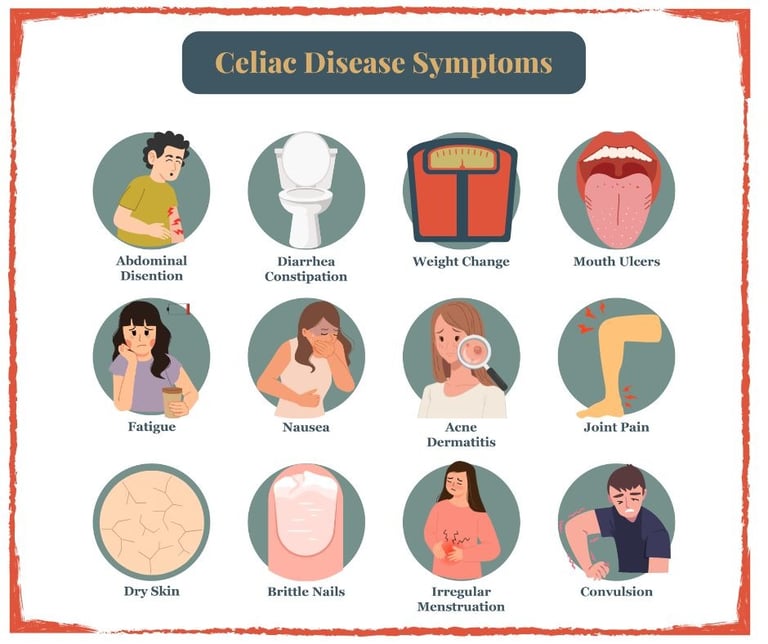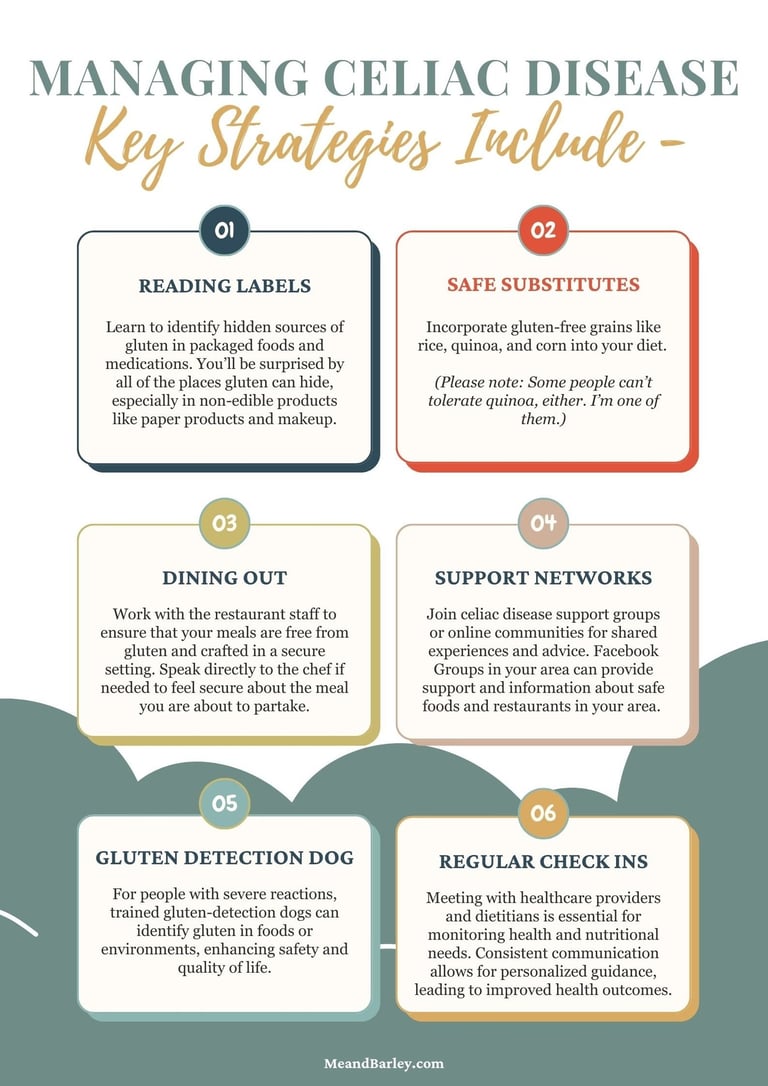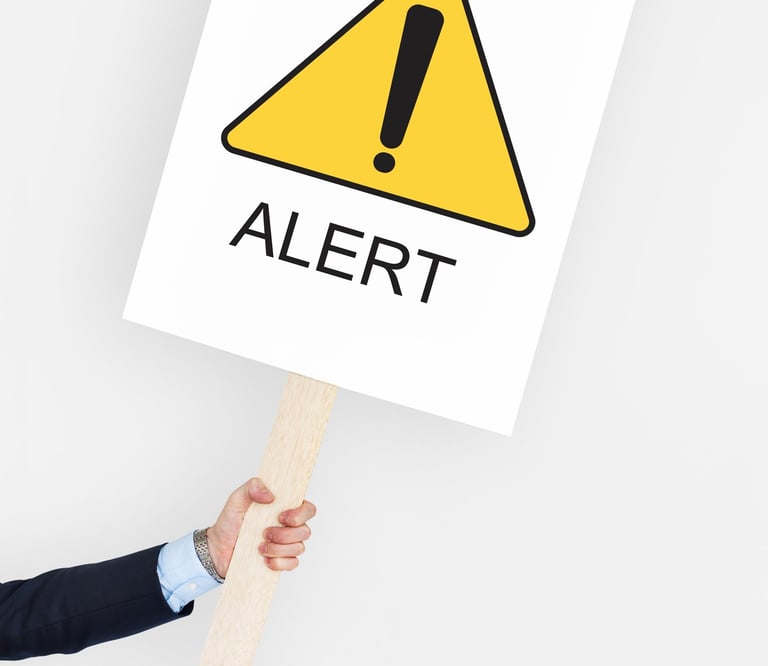
Navigating the Challenges of Celiac Disease with Awareness, Support, and Hope
Discover what living with celiac disease entails, from symptoms and diagnosis to managing a gluten-free lifestyle. Learn about Anna's personal journey, the importance of awareness, and how to navigate this hidden disability with grace and hope.
CELIAC DISEASEGLUTEN-FREE LIVINGHIDDEN DISABILITIESAWARENESSEDUCATION


Since my diagnosis of Celiac Disease, my life has been a whirlwind of research, specialist appointments, and countless hours learning to manage a condition that profoundly impacts my daily life and that of my family. To learn more about my diagnosis journey, read the post NAME.
Celiac disease is more than an allergy or food intolerance; it is a serious autoimmune condition. Even small amounts of gluten—a protein found in wheat, barley, and rye—can cause significant harm. Repeated exposure to gluten damages the villi in the small intestine, which are crucial for nutrient absorption. This damage can lead to malnutrition and other severe complications over time.
Celiac Disease
Understanding and Living with Celiac Disease
One of the most challenging aspects of gluten sensitivity in general, and celiac disease in particular, is its diverse range of symptoms, which vary greatly from person to person. For some, gluten exposure may result in mild abdominal discomfort, while others, like me, experience severe reactions requiring medical intervention and days or weeks of recovery. This variability can make the condition particularly difficult to diagnose and manage.
The Complex Problem of Gluten
Celiac disease is a chronic autoimmune disorder that affects millions of people worldwide. When people with this condition consume gluten, their immune systems mistakenly attack the lining of the small intestine, leading to widespread health issues.
What Exactly is Celiac Disease?


Symptoms of Celiac Disease
Symptoms can differ significantly between adults and children, and they may not always be digestive in nature. Here are some common manifestations:
Digestive Symptoms: Bloating, diarrhea, constipation, nausea, vomiting, and abdominal pain.
Non-digestive symptoms include fatigue, anemia, joint pain, headaches/migraines, depression, skin rashes (such as dermatitis herpetiformis), and osteoporosis.
In Children: Failure to thrive, delayed growth, irritability, and developmental delays.
In my case, I experience a mix of digestive and non-digestive symptoms, which can lead to missed workdays and embarrassing moments around friends and family.


Diagnosing Celiac Disease
Diagnosing celiac disease involves a combination of medical history, physical examination, and specific tests. Key diagnostic steps include:
Blood Tests: The most common tests check for elevated antibodies associated with celiac disease, such as anti-tissue transglutaminase (tTG) and anti-endomysial antibodies (EMA).
Endoscopy: If blood tests indicate celiac disease, a doctor may perform an endoscopy to examine the small intestine and take a biopsy to confirm the diagnosis.
Genetic Testing: This can determine if an individual has the HLA-DQ2 or HLA-DQ8 genes associated with celiac disease, although having these genes does not confirm the condition.
Finding a supportive doctor, someone who will listen to you and help you discover how best to manage your diagnosis and symptoms from accidental exposure, is key to managing this diagnosis. Including family and friends in your journey fosters understanding and support during difficult, potentially painful times.


Managing Celiac Disease
While there is no cure for celiac disease, adhering to a strict gluten-free diet can effectively manage it. Key strategies include:
Reading Labels: Learn to identify hidden sources of gluten in packaged foods and medications. You’ll be surprised by all of the places gluten can hide, especially in non-edible products like paper products and makeup.
Safe Substitutes: Incorporate gluten-free grains like rice, quinoa, and corn into your diet. (Please note: Some people can’t tolerate quinoa, either. I’m one of them.)
Dining Out: Communicate with restaurant staff to ensure gluten-free meals are prepared in a safe environment.
Support Networks: Join celiac disease support groups or online communities for shared experiences and advice. Facebook Groups in your area can provide support and information about safe foods and restaurants in your area. If you’re in Cartersville, Georgia - join the Gluten Free Bartow page for local insights.
Gluten-Detection Dogs: For people with severe reactions, trained gluten-detection dogs can identify gluten in foods or environments, enhancing safety and quality of life.
Regular Check-Ins: Meeting with healthcare providers and dietitians is essential for monitoring health and nutritional needs. Consistent communication allows for personalized guidance, leading to improved health outcomes.


Potential Complications
Ignoring your symptoms and ingesting gluten because your reactions are that severe can lead to problems. Neglecting to manage celiac disease can lead to severe complications, including:
Nutrient deficiencies (iron, calcium, vitamin D)
Osteoporosis
Infertility or pregnancy complications
Increased risk of other autoimmune diseases
Small intestine cancer or lymphoma (in rare cases)


Living Well with Celiac Disease
People with celiac disease can lead healthy, active lives with careful planning and education. The growing availability of gluten-free products and increasing awareness have made managing this condition easier than ever before. Regular check-ins with healthcare providers and dietitians are essential to monitor health and nutritional needs.
In the short time I’ve been living gluten-free, I’ve seen great strides in awareness and support for people with gluten allergies and sensitivities. This progress gives me hope and inspiration to keep advocating and raising awareness for all those living with gluten allergies to live happier, healthier, gluten-free lives.
My Mission
Celiac disease is a serious but manageable condition. By recognizing symptoms, obtaining an accurate diagnosis, and committing to a gluten-free lifestyle, you and I can take control of our health. Raising awareness and fostering understanding about celiac disease can make a significant difference in the lives of all who are affected.
As part of my journey, I’m fundraising for a gluten-detection dog to help me safely navigate my gluten-free life. I’ll share my experiences and insights in my blog series, Me and Barley: A Celiac Tail. Join me in spreading awareness and support for those living with celiac disease!


#bringbarleyhome


Fundraising milestones and events
Insights into the training process of gluten detection dogs
Personal anecdotes of living with gluten intolerance
The heartwarming moments of meeting Barley for the first time
Stay Tuned for Updates:


